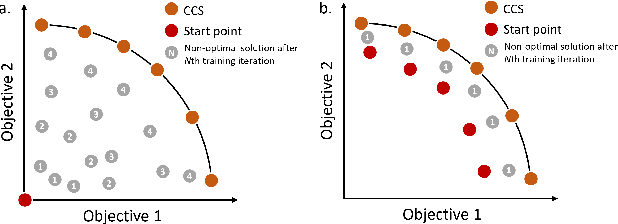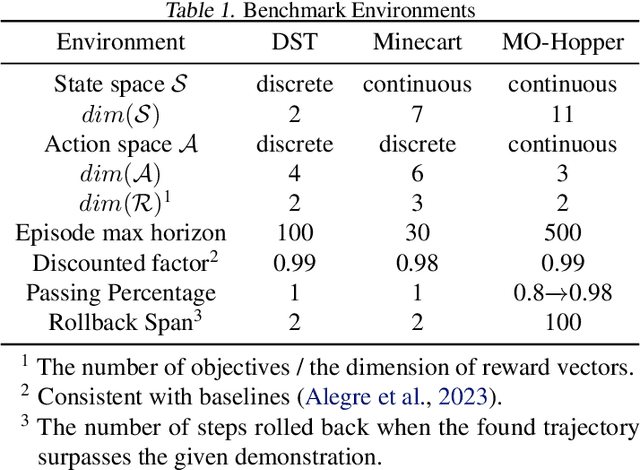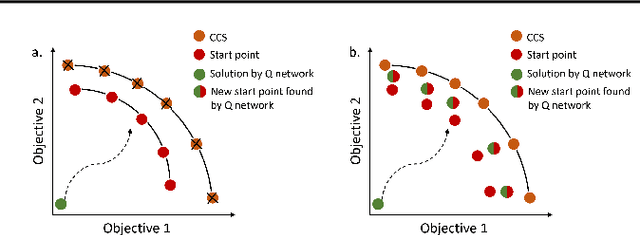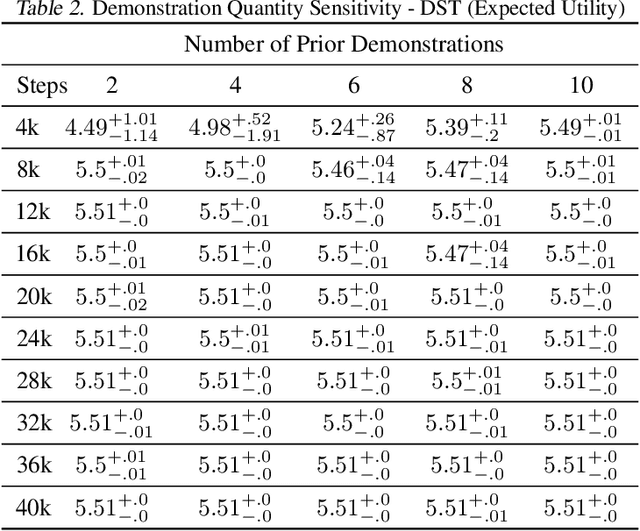Patrick Mannion
Demonstration-Guided Continual Reinforcement Learning in Dynamic Environments
Dec 21, 2025Abstract:Reinforcement learning (RL) excels in various applications but struggles in dynamic environments where the underlying Markov decision process evolves. Continual reinforcement learning (CRL) enables RL agents to continually learn and adapt to new tasks, but balancing stability (preserving prior knowledge) and plasticity (acquiring new knowledge) remains challenging. Existing methods primarily address the stability-plasticity dilemma through mechanisms where past knowledge influences optimization but rarely affects the agent's behavior directly, which may hinder effective knowledge reuse and efficient learning. In contrast, we propose demonstration-guided continual reinforcement learning (DGCRL), which stores prior knowledge in an external, self-evolving demonstration repository that directly guides RL exploration and adaptation. For each task, the agent dynamically selects the most relevant demonstration and follows a curriculum-based strategy to accelerate learning, gradually shifting from demonstration-guided exploration to fully self-exploration. Extensive experiments on 2D navigation and MuJoCo locomotion tasks demonstrate its superior average performance, enhanced knowledge transfer, mitigation of forgetting, and training efficiency. The additional sensitivity analysis and ablation study further validate its effectiveness.
Learning in Multi-Objective Public Goods Games with Non-Linear Utilities
Aug 01, 2024



Abstract:Addressing the question of how to achieve optimal decision-making under risk and uncertainty is crucial for enhancing the capabilities of artificial agents that collaborate with or support humans. In this work, we address this question in the context of Public Goods Games. We study learning in a novel multi-objective version of the Public Goods Game where agents have different risk preferences, by means of multi-objective reinforcement learning. We introduce a parametric non-linear utility function to model risk preferences at the level of individual agents, over the collective and individual reward components of the game. We study the interplay between such preference modelling and environmental uncertainty on the incentive alignment level in the game. We demonstrate how different combinations of individual preferences and environmental uncertainties sustain the emergence of cooperative patterns in non-cooperative environments (i.e., where competitive strategies are dominant), while others sustain competitive patterns in cooperative environments (i.e., where cooperative strategies are dominant).
MOMAland: A Set of Benchmarks for Multi-Objective Multi-Agent Reinforcement Learning
Jul 23, 2024



Abstract:Many challenging tasks such as managing traffic systems, electricity grids, or supply chains involve complex decision-making processes that must balance multiple conflicting objectives and coordinate the actions of various independent decision-makers (DMs). One perspective for formalising and addressing such tasks is multi-objective multi-agent reinforcement learning (MOMARL). MOMARL broadens reinforcement learning (RL) to problems with multiple agents each needing to consider multiple objectives in their learning process. In reinforcement learning research, benchmarks are crucial in facilitating progress, evaluation, and reproducibility. The significance of benchmarks is underscored by the existence of numerous benchmark frameworks developed for various RL paradigms, including single-agent RL (e.g., Gymnasium), multi-agent RL (e.g., PettingZoo), and single-agent multi-objective RL (e.g., MO-Gymnasium). To support the advancement of the MOMARL field, we introduce MOMAland, the first collection of standardised environments for multi-objective multi-agent reinforcement learning. MOMAland addresses the need for comprehensive benchmarking in this emerging field, offering over 10 diverse environments that vary in the number of agents, state representations, reward structures, and utility considerations. To provide strong baselines for future research, MOMAland also includes algorithms capable of learning policies in such settings.
A Meta-Learning Approach for Multi-Objective Reinforcement Learning in Sustainable Home Environments
Jul 16, 2024Abstract:Effective residential appliance scheduling is crucial for sustainable living. While multi-objective reinforcement learning (MORL) has proven effective in balancing user preferences in appliance scheduling, traditional MORL struggles with limited data in non-stationary residential settings characterized by renewable generation variations. Significant context shifts that can invalidate previously learned policies. To address these challenges, we extend state-of-the-art MORL algorithms with the meta-learning paradigm, enabling rapid, few-shot adaptation to shifting contexts. Additionally, we employ an auto-encoder (AE)-based unsupervised method to detect environment context changes. We have also developed a residential energy environment to evaluate our method using real-world data from London residential settings. This study not only assesses the application of MORL in residential appliance scheduling but also underscores the effectiveness of meta-learning in energy management. Our top-performing method significantly surpasses the best baseline, while the trained model saves 3.28% on electricity bills, a 2.74% increase in user comfort, and a 5.9% improvement in expected utility. Additionally, it reduces the sparsity of solutions by 62.44%. Remarkably, these gains were accomplished using 96.71% less training data and 61.1% fewer training steps.
Demonstration Guided Multi-Objective Reinforcement Learning
Apr 05, 2024



Abstract:Multi-objective reinforcement learning (MORL) is increasingly relevant due to its resemblance to real-world scenarios requiring trade-offs between multiple objectives. Catering to diverse user preferences, traditional reinforcement learning faces amplified challenges in MORL. To address the difficulty of training policies from scratch in MORL, we introduce demonstration-guided multi-objective reinforcement learning (DG-MORL). This novel approach utilizes prior demonstrations, aligns them with user preferences via corner weight support, and incorporates a self-evolving mechanism to refine suboptimal demonstrations. Our empirical studies demonstrate DG-MORL's superiority over existing MORL algorithms, establishing its robustness and efficacy, particularly under challenging conditions. We also provide an upper bound of the algorithm's sample complexity.
Divide and Conquer: Provably Unveiling the Pareto Front with Multi-Objective Reinforcement Learning
Feb 11, 2024Abstract:A significant challenge in multi-objective reinforcement learning is obtaining a Pareto front of policies that attain optimal performance under different preferences. We introduce Iterated Pareto Referent Optimisation (IPRO), a principled algorithm that decomposes the task of finding the Pareto front into a sequence of single-objective problems for which various solution methods exist. This enables us to establish convergence guarantees while providing an upper bound on the distance to undiscovered Pareto optimal solutions at each step. Empirical evaluations demonstrate that IPRO matches or outperforms methods that require additional domain knowledge. By leveraging problem-specific single-objective solvers, our approach also holds promise for applications beyond multi-objective reinforcement learning, such as in pathfinding and optimisation.
Utility-Based Reinforcement Learning: Unifying Single-objective and Multi-objective Reinforcement Learning
Feb 05, 2024Abstract:Research in multi-objective reinforcement learning (MORL) has introduced the utility-based paradigm, which makes use of both environmental rewards and a function that defines the utility derived by the user from those rewards. In this paper we extend this paradigm to the context of single-objective reinforcement learning (RL), and outline multiple potential benefits including the ability to perform multi-policy learning across tasks relating to uncertain objectives, risk-aware RL, discounting, and safe RL. We also examine the algorithmic implications of adopting a utility-based approach.
Inferring Preferences from Demonstrations in Multi-Objective Residential Energy Management
Jan 15, 2024Abstract:It is often challenging for a user to articulate their preferences accurately in multi-objective decision-making problems. Demonstration-based preference inference (DemoPI) is a promising approach to mitigate this problem. Understanding the behaviours and values of energy customers is an example of a scenario where preference inference can be used to gain insights into the values of energy customers with multiple objectives, e.g. cost and comfort. In this work, we applied the state-of-art DemoPI method, i.e., the dynamic weight-based preference inference (DWPI) algorithm in a multi-objective residential energy consumption setting to infer preferences from energy consumption demonstrations by simulated users following a rule-based approach. According to our experimental results, the DWPI model achieves accurate demonstration-based preference inferring in three scenarios. These advancements enhance the usability and effectiveness of multi-objective reinforcement learning (MORL) in energy management, enabling more intuitive and user-friendly preference specifications, and opening the door for DWPI to be applied in real-world settings.
Go-Explore for Residential Energy Management
Jan 15, 2024Abstract:Reinforcement learning is commonly applied in residential energy management, particularly for optimizing energy costs. However, RL agents often face challenges when dealing with deceptive and sparse rewards in the energy control domain, especially with stochastic rewards. In such situations, thorough exploration becomes crucial for learning an optimal policy. Unfortunately, the exploration mechanism can be misled by deceptive reward signals, making thorough exploration difficult. Go-Explore is a family of algorithms which combines planning methods and reinforcement learning methods to achieve efficient exploration. We use the Go-Explore algorithm to solve the cost-saving task in residential energy management problems and achieve an improvement of up to 19.84\% compared to the well-known reinforcement learning algorithms.
Evolutionary Strategy Guided Reinforcement Learning via MultiBuffer Communication
Jun 20, 2023



Abstract:Evolutionary Algorithms and Deep Reinforcement Learning have both successfully solved control problems across a variety of domains. Recently, algorithms have been proposed which combine these two methods, aiming to leverage the strengths and mitigate the weaknesses of both approaches. In this paper we introduce a new Evolutionary Reinforcement Learning model which combines a particular family of Evolutionary algorithm called Evolutionary Strategies with the off-policy Deep Reinforcement Learning algorithm TD3. The framework utilises a multi-buffer system instead of using a single shared replay buffer. The multi-buffer system allows for the Evolutionary Strategy to search freely in the search space of policies, without running the risk of overpopulating the replay buffer with poorly performing trajectories which limit the number of desirable policy behaviour examples thus negatively impacting the potential of the Deep Reinforcement Learning within the shared framework. The proposed algorithm is demonstrated to perform competitively with current Evolutionary Reinforcement Learning algorithms on MuJoCo control tasks, outperforming the well known state-of-the-art CEM-RL on 3 of the 4 environments tested.
 Add to Chrome
Add to Chrome Add to Firefox
Add to Firefox Add to Edge
Add to Edge